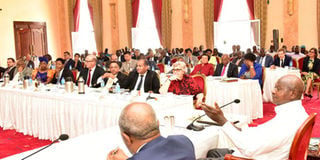Museveni sets terms for Kilembe Mines investor

President Museveni (R) Chairing the 6th round of the annual Presidential Investor's Roundtable (PIRT) at State House Entebbe on February 7, 2019. PPU PHOTO
What you need to know:
- Uganda’s largest copper mine, with estimated deposits of copper in excess of four million tonnes and an undetermined quantities of cobalt ore, Kilembe was active between 1950 and 1982.
- The mines were first run by two Canadian mining companies, Frosbisher Ltd and Ventures Ltd, which formed a joint venture, named Kilembe Mines Ltd (KML). KML built and operated a copper smelter in Jinja District but the smelted copper was always exported to the world market thereafter.
Kampala. President Museveni has said he is not in a hurry to identify an investor to take over Kilembe Mines to revamp copper mining in Kasese District.
Mr Museveni, who chaired the 6th Presidential Investors Roundtable (PIRT) meeting at State House Entebbe on Thursday, said he wants an investor who will commit to constructing a smelting plant and adding value to copper so that Uganda exports only copper products, not ore. Mining and value addition was one of the six thematic areas of this year’s PIRT.
“On the issue of Kilembe (mines), I will not allow what the Canadians were doing. Just blistering copper. We need it to be purified up to 98 per cent. What we call cathode copper. We want to see cables and transformers all made here,” Mr Museveni said.
He said the country has made significant shift in the management of other mineral products, including iron ore, hematite and clays that are now processed to add value, in factories established in the country by investors. “Therefore, those mining people you are talking about must be ready to add value from here. The minerals are there. They are many but they must be processed here and not producing for other countries to benefit. We want investment which will strengthen Uganda, we don’t want to be like these banana republics,” Mr Museveni said.
He was responding to a request by the chairman of the Uganda Chamber of Mines and Petroleum (UCMP), Mr Elly Karuhanga who said government needs to expedite the process of finding an investor to take over Kilembe Mines because copper would contribute to the economic growth of the country.
“As a country, we have failed to handle Kilembe (mines). Mining currently contributes 0.6 per cent to our GDP, yet Kilembe Mines is still inactive. We would like you, Mr President, to be kind enough and hand over our Kilembe to a serious investor,” Mr Karuhanga said.
Government in 2017 cancelled the concession of Tibet Hima Mining Company Ltd, a Chinese consortium, that had won the contract to revamp the mines about four years earlier. The Chinese who have since left Kilembe were supposed to extract at least 5 million tons of copper over a period of 25 years.
But a commission appointed by the State Minister for Investment, Ms Evelyn Anite, to look into the Chinese operations recommended the cancellation of the contract, saying the investor had caused financial loss to government.
The President said during the meeting that unlike the earlier days of Kilembe Mines, the government will not allow an investor who cannot commit to smelting copper to the level of purity.
Mr Karuhanga also asked the government to recall mineral licences that are in the hands of speculators so as to pave way for “serious” foreign investors to venture into the sector. He said more than 600 licences are in hands of people who are doing no exploration as was expected by Directorate of Geological Survey and Mines.
Sunday Monitor has learnt that by December last year, the Directorate of Geological Survey and Mines in the Ministry of Energy and Mineral Development had issued 606 exploration licences as of December 2018, according to data available on the website www.data.ug.
The same data indicate that there are 844 mineral concessions across the country that has a rich mineral endowment. Of these concessions, there are 168 location licences, 55 mining leases, and seven retention licences.
Mr Themba Ntali, a representative of Kara Gold, a South African company mining gold in western Uganda, said the country needs to do more by branding the gold being produced so that it is marketed worldwide.




